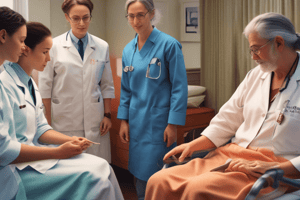Podcast
Questions and Answers
Who is typically part of a multidisciplinary team (MDT)?
Who is typically part of a multidisciplinary team (MDT)?
- Doctor, social worker, physiotherapist, and staff from local authority, housing, and voluntary organizations (correct)
- Psychologist, personal trainer, librarian, and bus driver
- Doctor, pharmacist, dentist, and police officer
- Nurse, teacher, chef, and firefighter
What is the main goal of a multidisciplinary team (MDT)?
What is the main goal of a multidisciplinary team (MDT)?
- Win awards for the team
- Maximize individual profits
- Create unnecessary bureaucracy
- Deliver person-centred and coordinated care and support (correct)
What does 'holistic and integrated' mean in the context of an MDT?
What does 'holistic and integrated' mean in the context of an MDT?
- Seeing the big picture and working together for the benefit of the service user (correct)
- Working independently without collaboration
- Ignoring the service user's needs
- Focusing only on physical health
Who can benefit from the services of a multidisciplinary team (MDT)?
Who can benefit from the services of a multidisciplinary team (MDT)?
What does an effective MDT aim to bridge?
What does an effective MDT aim to bridge?
Match the professional with their potential role in a multidisciplinary team (MDT):
Match the professional with their potential role in a multidisciplinary team (MDT):
Match the concept with its meaning in the context of an MDT:
Match the concept with its meaning in the context of an MDT:
Match the characteristic with its description related to a person with care needs:
Match the characteristic with its description related to a person with care needs:
Match the outcome with its impact of an effective MDT:
Match the outcome with its impact of an effective MDT:
Match the term with its meaning in the context of MDT coordination:
Match the term with its meaning in the context of MDT coordination:
Flashcards are hidden until you start studying




